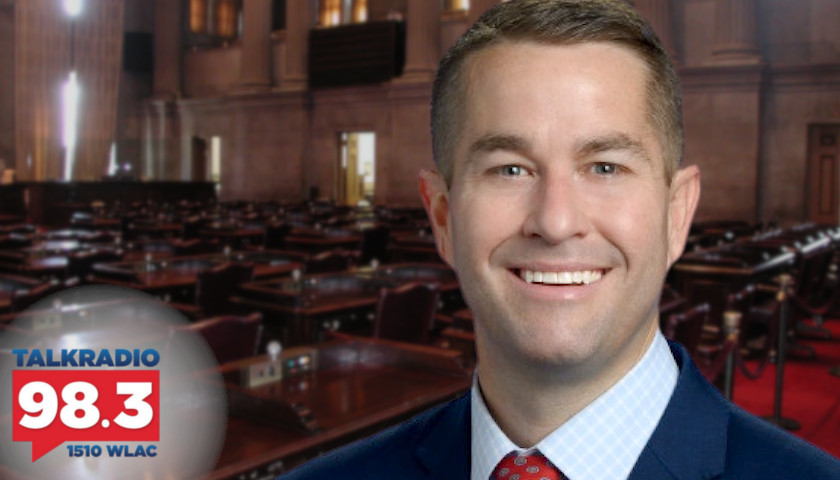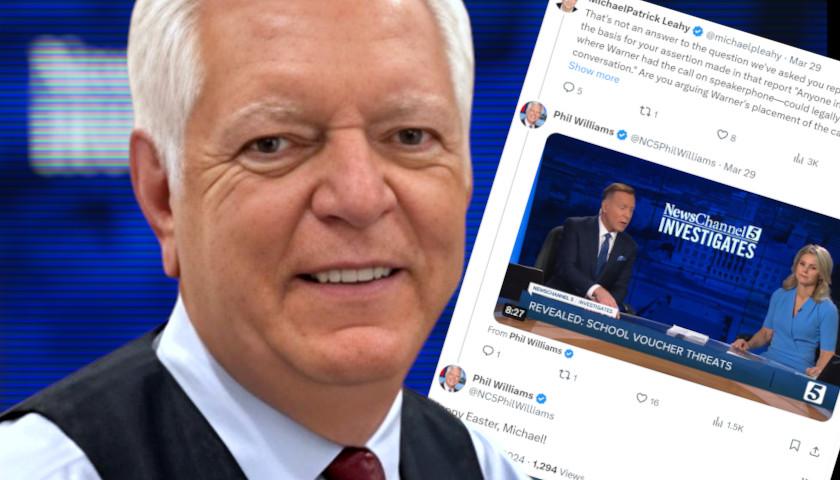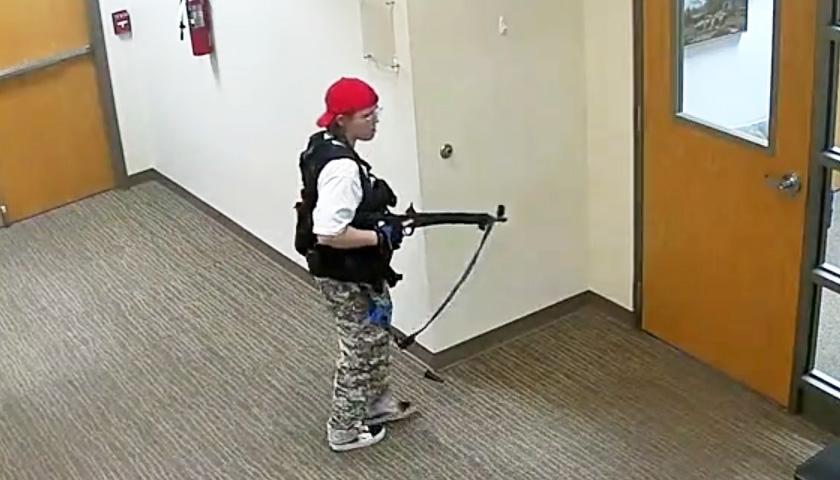Live from Music Row Thursday morning on The Tennessee Star Report with Michael Patrick Leahy – broadcast on Nashville’s Talk Radio 98.3 and 1510 WLAC weekdays from 5:00 a.m. to 8:00 a.m. – host Leahy welcomed State Representative (R-TN-46), Clark Boyd to the newsmaker line to talk about rural broadband issues in Tennessee and his proposed cybersecurity bill.
Leahy: We are joined on our newsmaker line now by State Representative Clark Boyd. He represents parts of Wilson County, all of Cannon County, parts of DeKalb County. Has offices in Lebanon. Welcome to the Tennessee Star Report, Representative Boyd.
Boyd: Hey, good morning, Michael. How are you?
Leahy: Great. I’m sorry, I don’t believe we’ve met in person, but I look forward to meeting in person and having you in-studio sometime to talk about what you’re doing in the state House of Representatives. I guess you were first elected, what, in 2018?
Boyd: I was. I came in, actually, a year ahead of the election. So when Senator Mae Beavers resigned her Senate seat to run for governor, that created a vacancy.
State Representative Mark Pody became the Senator. And then I got appointed by the County Commission to finish his last year. And then I ran and won that year.
Leahy: Gotcha. You ran against Mae in the 2014 state Senate primary. And she beat you 59-40. What’s your relationship with the former state Senator?
Boyd: Actually, it’s funny you mentioned that. We’ve actually become pretty good friends, and we joke oftentimes. Sometimes if we’re at an event talking, I usually will start it off by saying, “guys, I did – full transparency, I ran against Mae in 2014, but we’re friends now, so we’re fine.”
Leahy: That happens in politics a lot, doesn’t it?
Boyd: Yes, it does.
Leahy: It really does. So now you are the chairman of the Business and Utility subcommittee, and there’s stuff going on there with broadband access. Can you tell us what’s on your agenda this session in that area?
Boyd: Yes. Broadband is one of those issues that just unifies Tennesseans from the most conservative Republicans to most liberal Democrats. Everyone agrees that they want good access to high-speed internet.
And traditionally, we would draw down on RDOF federal dollars, which is the Rural Digital Opportunity Fund. And then ECD would put a little bit of money toward it.
Leahy: ECD is the state Economic Community and Development Department, right?
Boyd: That’s right. Sometimes there would be some money available through there. But since the pandemic, we have become a focus of this administration and there have been a lot of federal dollars. Right now, based on last year’s budget, there’s nearly $400 million that came down from the American Rescue Plan that’s available.
And so one of the problems that we have right now is we don’t really know who has internet access and who doesn’t. We’ve been looking at some old FCC maps, but the problem is in areas like Wilson County, where part of it is very urban and has good internet access, and part of it is rural.
If there’s a road that’s 10 miles long and the first mile has internet access, the FCC assumes that the whole area is covered. And so the state is coming up with a very detailed map, and it should be available in June, which will help us figure out what areas need broadband access.
In the last couple of years, we’ve made some changes that are kind of force multipliers in this universe. And that is we have allowed a lot of our electrical co-ops to get into the business. So if they provide electricity to someone and have electricity run to the home way out in rural Tennessee, it would be easier for them to run fiber out there.
And so we’re expecting big things in the next couple of years using some of these dollars. But we just want to make sure that it’s not being used by an Internet provider to just go upgrade their existing customers from 50 to 100 meg. We want to make sure that it goes to the people that need it.
Leahy: Is there a specific bill that you are championing in your subcommittee right now on this topic?
Boyd: Not on this one, because the money, it’s just grants that are available through ECD. We have not touched on that, particularly this year, because the grants are just available as needed to apply.
There is a piece of legislation that I am carrying this year that I would love to tell you about, and that is cybersecurity with regard to utilities. And this is not specific just to broadband, but it could be water, it could be natural gas, it could be electricity.
And so if you remember last year when the colonial pipeline got hijacked with ransomware, we’re starting to realize that that’s a real threat nationwide. And we’ve seen some water utilities get hijacked.
And in those cases, it wasn’t that they wanted any money paid. It wasn’t a ransom attack. They were trying to poison the system and change it … [with] hydrogen or sodium hydroxide or something, they were running the levels of it up, which would essentially poison the water. And so whether it be someone that’s doing it to hold it ransom and get money, or whether it be a foreign state that’s acting maliciously, or a terrorist attack, we need to make sure that our utilities have a game plan in place.
Leahy: What is this bill number and what is its prospect of being passed?
Boyd: I think it will pass. I’ve already started making it pretty well known in the committee, and we actually have had hearings this year. I was new to chairing the Business Utility Committee. The commerce chair was new.
And so we sat down and we started looking and realizing that there was so much redundancy with a lot of state agencies with oversight. And if an electricity co-op or even a municipal electricity provider gets their electricity from TBA, we have no authority.
And then there are some investor-owned utilities that go to the Public Utilities Commission, and then there are some public ones that go to the comptroller’s office. And it was so confusing and just make you dizzy trying to look at the flow chart of where everything goes.
So this year, we kind of said, let’s sit down and actually have these folks come to testify before the committee. And if we have time during committee, we do it then. If we don’t, we actually hold a special meeting on another day.
We’ve had these folks come through and kind of just inform us and educate us on the history of utilities in Tennessee and how we got there. So I believe that you’re going to see some changes probably in the next General Assembly with regard to some of the oversight that some of these state agencies have.
As I said, some of them are redundant, and it just doesn’t make sense to have two or three boards that all essentially do the same thing. I don’t see why they couldn’t be combined. And so there’s a lot of that in the works right now. And you asked for the bill number, and I should’ve have had that.
Leahy: Just tell us what it would accomplish. That’s really what we need.
Boyd: The cybersecurity bill?
Leahy: Yes.
Boyd: I think it’s going to mostly benefit Tennessee with some of the smaller mom-and-pop utilities. So if you live out in a rural area and you get your water from a public utility district or from a water authority or someone like that, those guys probably do not have a cyberattack plan. If you get it from a big electrical co-op, you’re probably in good shape.
Leahy: So would your bill help them get a cyberattack plan, or what would your bill do?
Boyd: There are some resources that would be available through the comptroller’s office if they were public in nature. But it would basically tell them you have to come up with a plan, and you have to certify that you have one each year, and it has to be submitted to the authority that has regulatory authority over you. And then you also have to pretty much carbon-copy the General Assembly on that.
Leahy: We had an op-ed by, and you may know this person, Deborah Collier. She’s a VP with a group called Citizens Against Government Waste, and the op-ed had to do with something up in Lenoir City up near Knoxville.
Basically, she said there’s a hearing going on this week to determine whether the Lenoir City Utilities Board should proceed with constructing a proposed broadband network.
And their argument is there are plenty of other options. Why are the utilities doing that? Are you familiar with that issue, and do you have any thoughts on it?
Boyd: Not that specific one in Lenoir City, but that is a theme that we’re concerned with statewide. We don’t want to see these dollars that are pretty much one-time dollars.
We don’t want to see them go somewhere and someone get into the broadband business if it’s not needed in that area. Now, if they want to do that organically, that’s their prerogative. But we also were very leery of publicly owned utilities.
Leahy: Yes. Public utilities getting into that business as well.
Boyd: To compete with the private sector.
Leahy: State Representative Clark Boyd with the 46th district, chairman of the Business and Utilities Subcommittee. Thanks for joining us. Come in-studio some time if you would, please.
Boyd: Thank you.
– – –
Tune in weekdays from 5:00 – 8:00 a.m. to The Tennessee Star Report with Michael Patrick Leahy on Talk Radio 98.3 FM WLAC 1510. Listen online at iHeart Radio.
Background Photo “Tennessee State House Floor” by Ichabod. CC BY-SA 3.0.









Government paid broadband does not unify me with those who show favoritism in spending. I paid to get mine, why does someone else get a free ride on my tax dollrs?